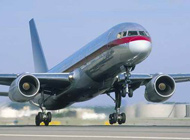
China and the European Union (EU) are set to negotiate an "open skies" agreement to meet the growing demand for passenger and cargo air routes.
Speaking at an EU-China aviation summit in Beijing yesterday, EU Vice-President Jacques Barrot said he has asked for a mandate from European transport ministers to discuss aviation deals with China.
"The very issue on the agenda of the new UK presidency next week will, indeed, be a discussion about the commission's request for this global mandate," Barrot said.
China expects to start negotiations with the EU in the fourth quarter of this year, according to a joint declaration signed by Barrot and Yang Yuanyuan, director of the General Administration of Civil Aviation of China (CAAC), prior to the summit.
"We are ready to balance the interests of both the EU and China while revising existing bilateral air services agreements," said Wang Ronghua, director general of the CAAC's Department of International Co-operation.
Currently, only 20 European and Chinese airlines are allowed to operate China-EU routes, offering flights to 10 Chinese and 15 European cities.
At the moment, the total number of flights between the Chinese mainland and Europe each week amounts to only 226 passenger and 60 cargo flights.
"Growth forecasts suggest that EU-China air traffic will increase by around 7 per cent per year over the next 15 years," Barrot said.
Demand for air transport is being fuelled by a more than 15 per cent annual increase in EU-China trade. The EU is China's main trading partner while China is the EU's second largest trading partner after the United States.
An EU-China aviation agreement "could consider a broad range of issues of mutual interest including safety, security, environmental issues and application of competition law," Barrot said.
As a first step, such an agreement should provide legal certainty to existing bilateral air services agreements between EU member states and China, which are unsustainable following the open skies judgments of the European Court of Justice, Barrot said.
The judgment said that previous bilateral agreements between China and the member states were void.
Both Chinese and European airlines welcomed the proposed liberalization of the market.
Yang Lihua, vice-president of Air China, said her company supports the liberalization of the Sino-EU aviation market on a gradual and equal basis.
Air China, whose international routes account for more than 50 per cent of its business, has been increasing its capacity on China-EU routes. It is operating 46 flights per week between China and EU members this summer.
"In the next five years, we are planning to expand our flights significantly to EU destinations," Yang said.
Keijo Suila, president and chief executive officer of Finnair Group, described liberalization as an opportunity to stimulate the economic growth of both China and EU members.
He said his company would continue to build its network between Helsinki and various points in China with the support of the EU. "There is no way back," he said, "only forward."
(China Daily July 1, 2005)
|

